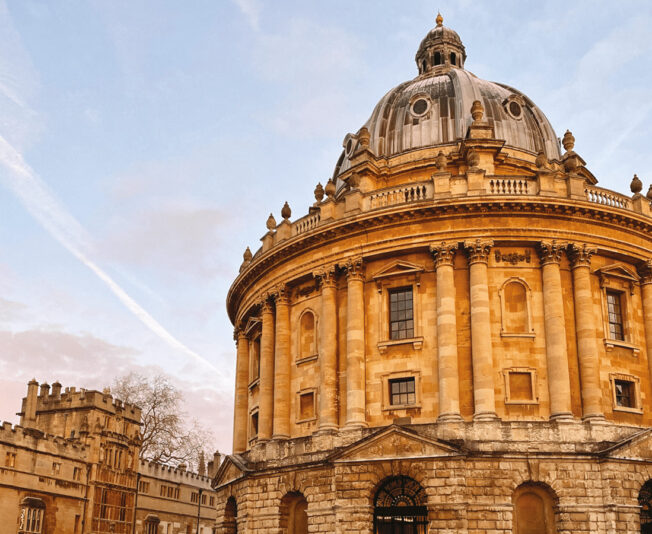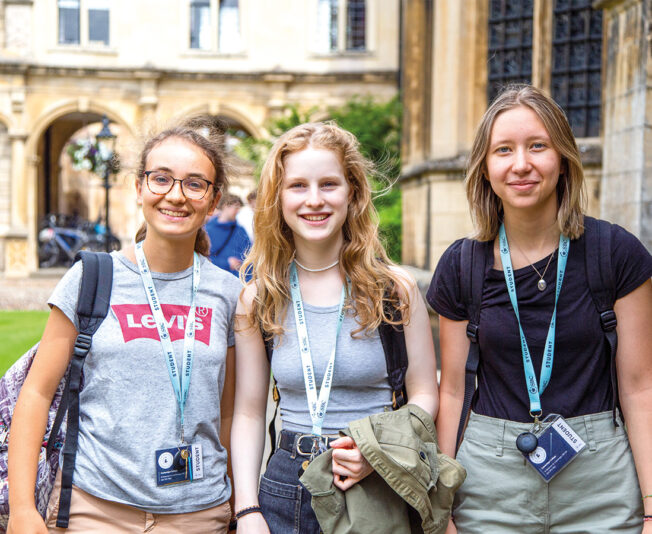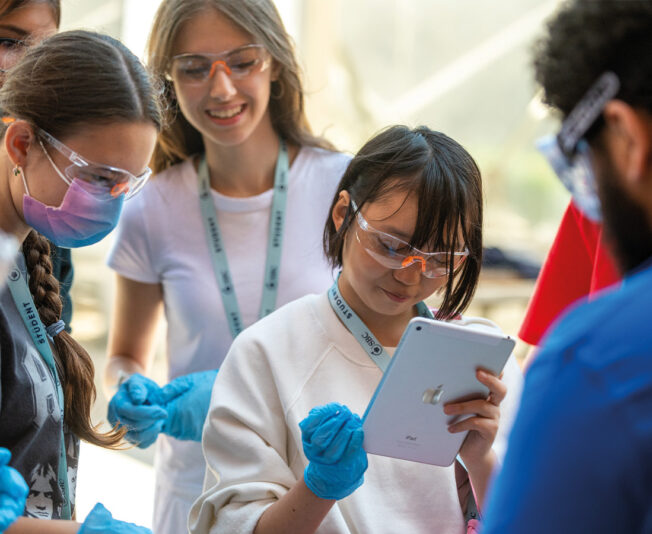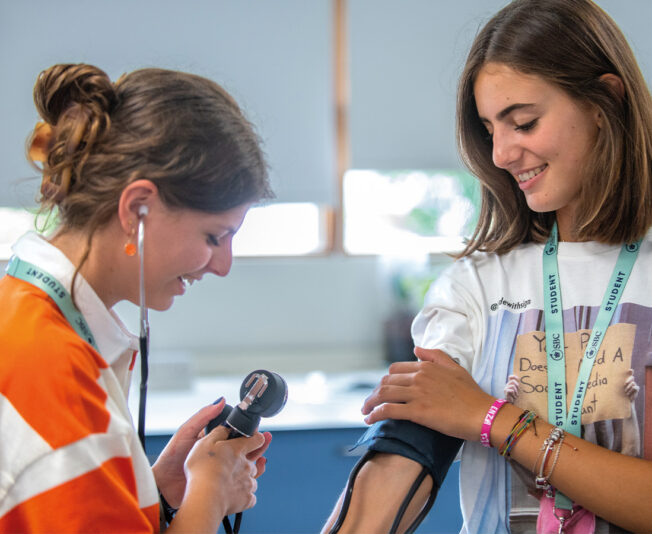Summer Boarding Courses
Why study at a Medicine summer school in the UK?

According to the Times Higher Education (THE) World University Rankings, Oxford and Cambridge University are in the top three universities in the world to study Medicine. Are you thinking of studying Medicine in the UK? If so, you may want to study at a Medicine summer school in England before you apply to study Medicine at university as part of developing your foundation training. We have put together some frequently asked questions and five reasons to study at our Medicine summer schools in Oxford and Cambridge.
1. Study Medicine in a World-Renowned University City
Summer 2022 provides our students with the opportunity to study medicine at our colleges in Oxford and Cambridge, allowing them to have the perfect preparation for a medical degree. Our Medicine summer courses not only provide students with a further insight into undergraduate medicine but also the chance to eat, sleep and study at one of the most prestigious universities in the world. The Oxbridge Universities are famous for their collegiate system, where students live and study alongside their peers; and while students spend their summer with us, they will be able to try this out for themselves and experience college life whilst furthering their knowledge in the world of modern medicine.
In both cities, our colleges are near the city centre so students have plenty of time to explore the cobbled streets of Oxford and Cambridge. Our social and wellbeing programme also ensures you’ll see the highlights of these beautiful cities with museum visits, punting, scavenger hunts, college tours and shopping time built into the programme. Oxford and Cambridge are centres of academic excellence and world-renowned research, so this is your chance to spend your summer following in the footsteps of some of our best-known medical professionals and world leaders as you build the foundations of your knowledge in clinical practice and pre clinical medicine in a world renowned clinical environment.

2. Plan Ahead and Prepare for Studying Medicine at University
A career in Medicine and medical science is said to be one of the most rewarding things that you can dedicate your life to, but it really is a vocation rather than a career – there is nothing about studying or working in the national health service that is 9 to 5. Planning ahead and preparing effectively are two ways in which you can help yourself, and if you’re thinking about studying for a medical qualification then a Medicine summer school is a great place to start in graduate medicine.
Our Medicine summer courses offer you the chance to participate in a pre clinical course, to learn the basic principles of what it’s really like to study and work in health sciences, biomedical science, and general practice which underpins your medicine and speciality training knowledge whilst allowing you to broaden your awareness of the huge number of career opportunities that Medicine can offer you. For school leavers in their final year Summer school breaks things down for you, introducing the basics of some of the main fields of medicine but also, importantly, giving you the opportunity to meet some medicine students and experienced practitioners, ask them some questions about the whole process and learn from them what it’s really like to study in the UK throughout an academic year.

3. Enjoy Academic Summer School Excursions
As part of your Medicine summer course with SBC you’ll have the chance to participate in an academic excursion where you’ll visit our capital city, the home of some of the most cutting-edge research and practice in the Medicine world. As part of this excursion you will participate in a tour of Medical London, seeing the main important medical sites, and visit a working hospital.
Your day in London will be supported by your Medicine tutor who will help you to get the most out of the day, and you’ll visit along with your fellow students so that you can reflect together on the amazing things that you see and learn over the course of the day. The academic excursion really does give you a unique opportunity to understand the scope of the vocation that you’re interested in. Previous students have said that it was one of the most valuable things they did whilst at our summer school in England.

4. Gain Practical Medical Experience
SBC’s Medicine course features an extensive variety of practical, hands-on, medical experiences. All students will complete training in taking basic medical measurements, including using stethoscopes, blood pressure cuffs and pulse oximeters. In addition, all students will complete more advanced training in suturing, as part of a stitching and emergency response workshop. Finally, all students will participate in a full day First Aid Training course, which will prepare students for a great variety of urgent medical procedures. Through taking part in the First Aid Training course, students will receive official certification from an accredited body that they are First Aid trained.

5. Develop Practical and Theoretical Knowledge
Students who enroll in our Medicine summer course will develop both their practical and theoretical knowledge of Medicine, and will be better prepared to study Medicine in the future. Their theoretical knowledge will include; practical studies of what doctors and health professionals do; how to assess patients; how to diagnose pathologies, accidents and illnesses; and what it is like to study Medicine at university. Students will also examine key questions in the practice of Medicine regarding ethical issues. They will also have a broad variety of hands-on, practical experiences, including becoming fully qualified in First Aid training.
We hope our guide to studying medicine in the UK has been useful. If there are any questions or queries about any of our medicine or science related courses at SBC then our dedicated admissions team are on hand to answer any of your queries. Book a free consultation today!
FAQs
What is the study of medicine?
Medicine is the science and practice of establishing the diagnosis, prognosis, treatment, and prevention of disease. Medicine encompasses a variety of health care practices evolved to maintain and restore health by the prevention and treatment of illness as well as medical ethics.
How many years is the study of medicine?
Medical schools typically take 4 years to complete; then there is a 3 to 7 year residency after that, where medical students undergo supervised clinical training in their specific field of focus in medicine study.
Is it harder to study medicine?
Medical education comes with a certain expectation to work harder on average than most other qualifications, bringing about innumerable practical and intellectual challenges relying heavily on cognitive abilities, abstract reasoning and situational judgement. There are generally more contact hours than other subjects with practicals and lectures taking up a great deal of time.
What is the study of medicine called?
Pathology as a medical specialty is the branch of medicine that deals with the study of diseases and the morphologic, physiologic changes produced by them. As a diagnostic specialty, pathology can be considered the basis of modern scientific medical knowledge and plays a large role in evidence-based medicine.
How many years does it take to study medicine in the UK?
The length of a medical program in the UK varies in dependence on what specific field you’re enrolled. Most medicine programs last for 6 years while dentistry and pharmacy programs last for 5 years. If students are not ready to penetrate the tough entrance competition, they can attend a one-year Medical Foundation course.
What qualifications do I need to study medicine in the UK?
To gain entry into most universities, good GCSE grades in Maths, Science and English are required, in addition to a combination of other GCSEs, AS levels and A-levels. Chemistry at A-level and often A-level biology and one other science subject is often required, for example, physics (or physical science), or mathematics.
Is studying medicine in The UK good?
The UK has claimed the second-highest number of Nobel Prizes for medicine since 1901, just ahead of Germany. Studying at medical schools in the UK is a chance to benefit from world-leading expertise in research-intensive establishments.
How many years does it take to become a doctor in The UK?
Courses normally last five years, or four years for a graduate entry programme. They involve basic medical sciences as well as clinical training on the wards and in the operating theatre. After graduation, you’ll enter the two-year Foundation Programme. You’ll be provisionally registered with a licence to practise while completing the first year.
How hard is it to get into a medical school in The UK?
The applicants to places ratio is around 1:4. This means the medical school admission is extremely competitive requiring a lot of academic ability. Most students who apply have already got very high grades, excellent critical thinking skills and have achieved most of the medical school requirements before considering their application. So strong personal statements allowing students to demonstrate any medical related personal interests, experience of voluntary work and any experiences connected to problem based learning are a real benefit.
How much money do you need to study medicine in the UK?
If you’re an international student looking at provisional registration into any undergraduate course in the UK you want to make sure you have at least over £10,000 in your account at the very beginning. At some competitive courses that are on offer tuition fees for international students may exceed the amount of £50,000 per year.
Which medical school is the easiest to get into in the UK?
Number one on the list, and the easiest medical school to get into in the UK, is the medical school at Queen’s University Belfast. While most universities are not “easy” to get into, this one is comparatively ‘easier’ to enroll, as it has an acceptance rate of 38.3% — which is a lot higher than many universities.
How do medical students apply to study medicine at Oxford or Cambridge?
The closing date for application for medical degrees each year is October in the year before you intend to start the course, e.g. the deadline for October 2022 entry will be October 2021.
All applications must be submitted via UCAS, and every applicant must register to sit the biomedical admissions test (BMAT) by 1 October as well as completing their standard personal statement.
According to their website, the University of Oxford will not accept BMAT results from the September sitting for A100 Medicine.
Are there any other tests I need to pass in order to enroll into a UK medical school?
In addition to an application through UCAS, some medical schools require applicants to take admission tests. This can often include a University Clinical Aptitude Test.
UCAT is used as part of the selection procedure for 30 medical schools in the UK. The UCAT test focuses on testing attributes considered to be valuable for healthcare professionals. It aims to ensure applicants selected to medical school have the mental abilities, quantitative reasoning skills, attitudes and professional behaviours required to be successful doctors.
As part of access to many medical schools there is a situational judgement test.
A situational judgement test involves verbal reasoning, which assesses ability to think logically about written information and arrive at a reasoned conclusion.
Speak to an admissions expert today!
Our admissions experts are happy to help answer any questions you may have.
If you would like support choosing the perfect course for your child, you can request a free private consultation below.